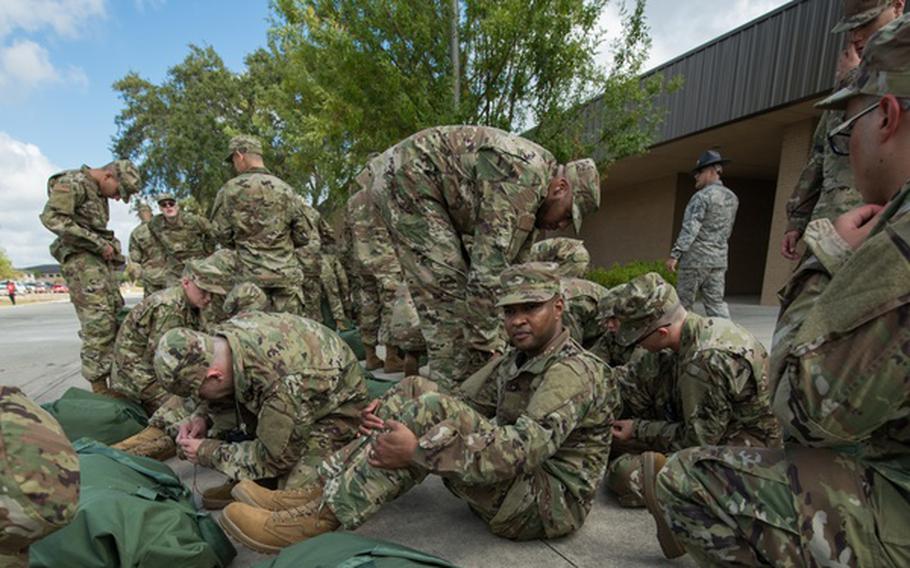
This work, BMTs receive first OCP uniforms. (Sarayuth Pinthong)
After the bomb blast at the airport in Kabul, Afghanistan, I did what I can’t help doing: I found the names of the service members who died and read them aloud. And then I thought what I can’t help thinking: Those are my Marines, and they’re gone now. My Marines. You might find that strange, given that I’d never met them, and that I haven’t served in uniform for more than a year now. But that’s how it works, particularly in the Marine Corps: Wherever they are, whenever they served, whatever they look like or where they came from, they’re your Marines. The things that divide us are nothing to the things that unite us.
The Marine Corps’ commitment to that sentiment might be lost on 1st Lt. Sukhbir Singh Toor, who was recently profiled in The New York Times. Against great odds, he’s fighting for the right to wear a turban and a beard in uniform, in keeping with his Sikh faith. He believes he can honor his First Amendment right to religious expression without in any way compromising the things that unite us or the work he is called upon to do.
He’s right. And the Marine Corps would do well to agree with him.
Obstacles to serving with visible articles of the faith are relatively new, especially when juxtaposed against how long Americans of different religions have been serving in the armed forces. American Jews, Muslims and Sikhs have had their contributions noted throughout our military history, from Muslim service members in the Revolutionary War to Jewish generals in the Union Army to a Sikh soldier who famously fought for his citizenship after World War I. It wasn’t until the 1980s that a new, arbitrary prohibition on accommodations for articles of faith posed hurdles for those who keep religiously mandated beards, as well as turbans, hijabs and other head coverings. Congress laid the groundwork for opposing this Reagan-era policy with the Religious Freedom Restoration Act in the 1990s, which asserted that the United States could not “substantially burden” an individual’s free exercise of religion without a “compelling governmental interest” exercised in “the least restrictive means.”
For more than a decade, advocacy and legal groups — with support from veterans, civilian leaders of the Department of Defense, and bipartisan groups of elected officials in Congress — have been working to build on RFRA to ensure that qualified service members are not forced to choose between adhering to their sincerely held religious beliefs and their chosen careers of serving their country. In doing so, they have established plenty of proof-positive cases that articles of faith pose no barrier to honorable service, much less to the strength of the bonds that unite us. Indeed, the U.S. Army and U.S. Air Force already changed their policies — in 2017 and 2020, respectively — to put in place a clearer process for seeking a religious accommodation and to ensure that, once secured, accommodations follow a soldier or airman throughout their career. As a result, service members honoring their articles of faith are both enlisted and officers; they serve everywhere from Afghanistan and Iraq to their state national guards to the U.S. Military Academy at West Point. And they are as able, as dedicated, as fidelis as service members of any other stripe or creed.
For that reason, religious backgrounds — like racial, ethnic or gender identity, or sexual orientation — should not and need not be barriers to military service. Making sure that these aspects of identity receive appropriate space is just another step on the road to a military that draws on the full might, diversity and devotion to service that distinguish our country from all others. “Unit cohesion” or “uniformity of appearance” were trotted out to oppose desegregation, the opening of combat positions to women, the repeal of “don’t ask, don’t tell,” and the ban on transgender troops. They were wrong on their own terms and they are wrong as a matter of rights, principle and our nation’s security.
The Army and the Air Force have already taken the right step by updating their uniform and grooming accommodations policies. The other service branches should now make the same choice to embrace individuals like 1st Lt. Toor and ensure that we continue to pull from the widest possible talent pool of dedicated and qualified Americans.
Anything less leaves talent on the table and fails to live up to the very ideals for which we’re pledged to fight.
Jon Margolick is the executive vice president of the Truman National Security Project. He previously served as a judge advocate in the U.S. Marine Corps. Views expressed are his own.